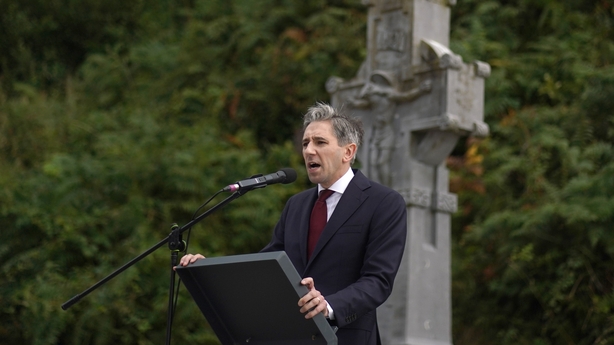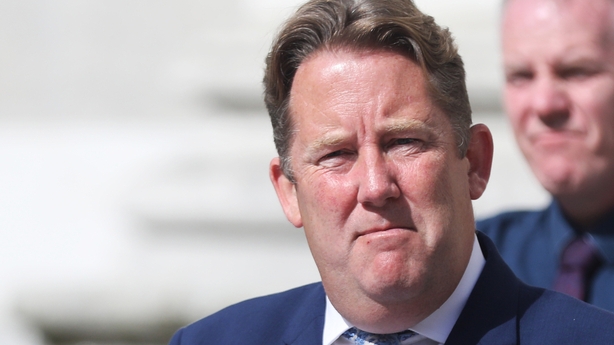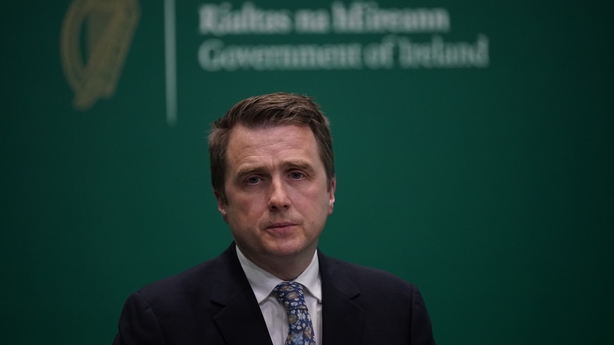The annual commemoration of Michael Collins's assassination 102 years ago is a symbolic milestone in the political calendar.
The national event at the spot where the political and military leader was shot is always a solemn occasion. But it also sets the agenda ahead of the return of the Dáil in September.
On 25 August last year, Fine Gael leader Simon Harris gave the keynote address at Béal na Bláth, Co Cork.
As taoiseach at the time, he knew a general election was just months away.
He spoke passionately about fixing the housing crisis and said as a father of young children he wanted to "solve this national malaise now, before it becomes their problem".
He predicted: "This year, we will exceed our housing targets with almost 40,000 homes built."

Four days earlier, Mr Harris had received a letter from then minister for housing Darragh O'Brien.
Mr O'Brien said estimates from independent analysts, who were unnamed, "show we are on track to exceed our housing targets for 2024 and I estimate we will approach 40,000 housing units in 2024".
One of the targets he referenced was the previous coalition's 'Housing For All' plan which stated that 33,450 homes would be built last year.
Last week, figures from the Central Statistics Office showed only 30,330 were finished in 2024 - a drop of 2,195 on the previous year.
The official target was missed and Mr O'Brien's estimate of approaching 40,000 housing units was vastly overoptimistic.
But there were strong indications last autumn that housing completions were unlikely to increase.
On 18 September the Central Bank forecast there would be fewer homes built last year than in 2023.
Then on 24 October the CSO published figures for the first three quarters of 2024 which showed house completions were lagging behind the previous year, at 21,634 compared to 22,325 in 2023.
In the Dáil that day, Mr O'Brien was questioned by Sinn Féin's finance spokesman Pearse Doherty who said the Government was "nowhere near meeting its target despite all the spin".
In response, Mr O'Brien said: "The target this year under 'Housing for All' is 33,450. I have consistently said we will exceed that target. I still confidently predict - the Deputy and his colleagues in Sinn Féin will be disappointed - that it will be the high 30,000s to low 40,000s this year."

This bullish statement came a month before the country went to the polls on 29 November with housing top of the agenda.
On RTÉ's Morning Ireland this week, the new Minister for Housing James Browne described the figures for last year as "disappointing".
Sinn Féin's Housing Spokesman Eoin Ó Broin claimed: "The government clearly and deliberately misled the electorate in the run-up to November's General Election."
But now the focus turns to 2025 and there are some worrying indications that residential construction may be plateauing.
Construction consultancy Mitchell McDermott is forecasting 32,000 homes will be built this year and warns that housing delivery is "stagnating".
The new coalition of Fine Gael, Fianna Fáil and Independents has set a target of 300,000 over the next five years or 60,000 homes per annum.
But Mitchell McDermott says there is "little chance" of that unless there are "drastic measures" introduced.

A key issue it highlights is the 24% drop in apartment completions last year which drove the overall number of homes lower.
The indications are that this trend will continue.
There were 14,000 planning permissions for apartments last year. The previous figure was 21,000.
Mitchell McDermott blames that on previous government policy which it says has discouraged international investors from putting funds into residential construction.
It said the government changed regulations in December 2022 and "build to rent", where investors develop an apartment block to let to tenants, was no longer permitted as a category under planning.
It said there were similar policy changes "which resulted in co-living being banned before it was given a chance to prove itself".
It also said the introduction of rent caps and the way they were introduced "was the final straw for a lot of the international funds, who have taken their business elsewhere".

The last coalition faced huge criticism from the opposition about large international investors building apartment blocks for high rental prices.
During the General Election, opposition parties urged the government to go further and freeze rents completely.
James Browne faces a challenging task.
But it has been made all the tougher because he and the new Government are starting from a position where Darragh O'Brien promised much more than was delivered.







